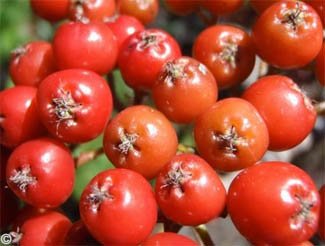 There are many things you can offer a chinchilla from certain woods for gnawing and 'safe' treats you can use sparingly during taming sessions. There are many things you can offer a chinchilla from certain woods for gnawing and 'safe' treats you can use sparingly during taming sessions.
There are two important things you should always remember before offering anything to a chinchilla other than hay, chinchilla pellets and water:
- Is the product in the 'Safe' group or 'Forbidden'?
- Will the product interfere with the strict daily nutritional values of 21.5% fibre, 14-16% protein, 3.5% fat and oil, 4% sugar, 6% minerals and 10% moisture/trace element, 32.400 Vitamin D, 14.000 Vitamin A, 80 Vitamin E ?
It must also be remembered that chinchillas have a sensitive digestive tract and any sudden inclusion or changes to their diet will cause digestive disorders. To eliminate any potential digestive problems, always introduce new food gradually whilst phasing out the old.
Listed below are 4 categories: Safe Foods; Forbidden Foods; Safe Woods and Unsafe Woods. Please check this list before offering any new product to a chinchilla - caution must still be maintained at all times against allergies to a particular substance as all chinchillas are different just like us humans.
Safe Foods/Treats For A Chinchilla
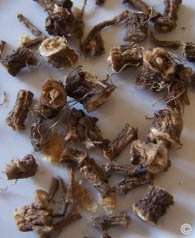 Mountain Ash Berries - Full of antioxidants and good for chinchillas, 2-3 can be offered daily. Mountain Ash Berries - Full of antioxidants and good for chinchillas, 2-3 can be offered daily.- Fruit Tree Twigs - A new twig can be provided each day from any fruit tree where the fruit bears seeds (apple, pear etc). Do not offer woods from fruit trees that bear a pip (cherry, plum etc). Fruit twigs will also aid the chinchilla's tooth filing process as well as act as a natural treat.
- Dried Rose Hips - One rose hip can be offered daily as it has plenty of fibre and helps a chinchilla file its front incisors while breaking down the hard exterior.
- Dried Herbs - Dandelion (and DRIED roots), nettles, rosemary - blackberry - strawberry leaves are ok on the digestive tract and helps eliminate some ailments but only offer in very small pinches.
- Marshmallow Root - Chinchillas love marshmallow root but caution should be taken as it contains high levels of Vitamin A. Marshmallow Root also provides vitamin B and thiamine, which are essential for chinchillas - offer small piece once every 1-2 weeks.
Foods/Treats with Precautions
- Grains - Grains are high is carbohydrates and phosphorus. Phosphorous can lead to calcium deficiency causing tooth and bone disorders.
- Vitamins and Minerals - If you are providing the correct formula diet, there should not be any need for supplementing chinchillas. Additional supplements can throw out the original nutritional balance and should only be offered under supervision of a vet. Pregnant, sick or calcium deficient chins will need extra supplements but must be offered in the correct amounts.
- Fruit - Small piece (1cm x 1cm) of apple, strawberry or pear can be given sparingly (to prevent diarrhoea).
- Porridge Oats - Like grains, oats are high in carbohydrates and Phosphorous, which can lead to calcium deficiency, tooth and bone problems.
- Treat Sticks - Such as herb or calcium sticks, although the calcium to phosphorus ratios are ok, they also contain added salt and sugars. If you offer a treat stick do not provide any other treats until the stick has finished and do not offer more than one stick every 3 months.
Forbidden Foods/Treats For Chinchillas
- Anything Containing Animal Ingredients - Chinchillas are strictly vegetarians and providing them products with animal ingredients will have dire consequences on a chinchilla's digestive system.
- Chocolate - High in fat, carbohydrates and sugar and is extremely toxic to chinchillas.
- Corn / Maize - Will cause bloat, which is potentially fatal in chinchillas.
- Nuts and Seeds - Extremely high in fat, protein and oils, which leads to calcium deficiency and liver damage. Can also turn rancid.
- Protein in Excess - Protein in-take above 20% will cause severe liver damaged and disease.
- Vegetables and Greens - Contrary to popular belief, vegetables are seriously dangerous for chinchillas and will cause bloat! Chinchillas do not need greens like other rodents and should not be confused with the greenery a chinchilla would normally eat in the wild as the two are not the same!
- Tap Water - Contains harmful chemicals, which over time is unhealthy for a chinchilla. Always provide tap water that has been boiled and left to cool.
- Pellet Mixes - Chinchillas are selective eaters and will ignore the pellets and consume only the tasty fatty extras instead.
- Tree Bark - Even if the wood itself is safe to offer, the bark of many plants and trees are harmful as bark is frequently contaminated with plant diseases, parasites or arsenical's from spray material. Sap is contained in the layers and can also have devastating effects on a chinchilla's respiratory system.
Safe Woods For Chinchillas
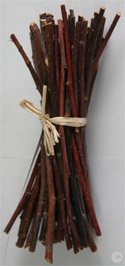 Any wood from a fruit tree bearing seeds (apple, pear, grape etc) Any wood from a fruit tree bearing seeds (apple, pear, grape etc)- Alderberry
- Bamboo
- Cottonwood
- Crab Apple
- Dogwood Rose
- Elm
- Hazelnut
- Horse Apple
- Kiwi
- Mulberry
- Pine (untreated and kiln dried)
- Willow (weeping, goat or pussy)
Unsafe Woods For Chinchillas
- Any wood from a fruit free that bears a stone (peach, cherry, plum etc)
- Almond
- Beech
- Birch
- Cashew
- Cedar (including wood shaving for bedding or floor covering).
- Chestnut
- Citrus Woods (such as lemon, orange etc)
- Elderberry
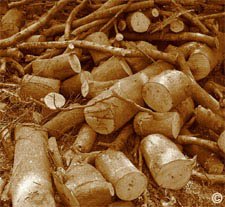 Eucalypts Eucalypts- Fir
- Juniper
- Maple
- Oak
- Pine (freshly cut or bark)
- Pinecones
- Rosewood
- Sandalwood
- Sycamore
- Teak
- Walnut
- Yew
Some Points To Remember When Offering Extras:
A sick chinchilla should never be given any treats until they are fully better! A chinchilla's digestive system will already be under great stress fighting the illness and including treats will only make a chinchilla worse.
Pregnant chinchillas must only be offered substances that are both safe for the chin-mum and the developing foetuses. A pregnant chinchilla will need supplementation under the supervision of a veterinary surgeon to ensure the safe development of the unborn foetuses.
Chinchillas with an underlying health issue should only be offered treats that will not cause further damage to the existing problem. Depending on the underlying illness will determine if and what treats you can offer.
Further Reading Relating To Chinchilla Nutrition:
Chinchilla A-Z Health & Sickness Bible, Chinchilla Health, Hand Feeding, Illness, Sickness & Disease, Nutrition (Food and Diet), Minerals And The Relation To Chinchilla Disease, Pregnancy, Supplementation, Vitamins And The Relation To Chinchilla Disease.
|

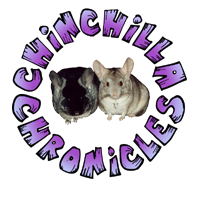
 There are many things you can offer a chinchilla from certain woods for gnawing and 'safe' treats you can use sparingly during taming sessions.
There are many things you can offer a chinchilla from certain woods for gnawing and 'safe' treats you can use sparingly during taming sessions.

 Eucalypts
Eucalypts